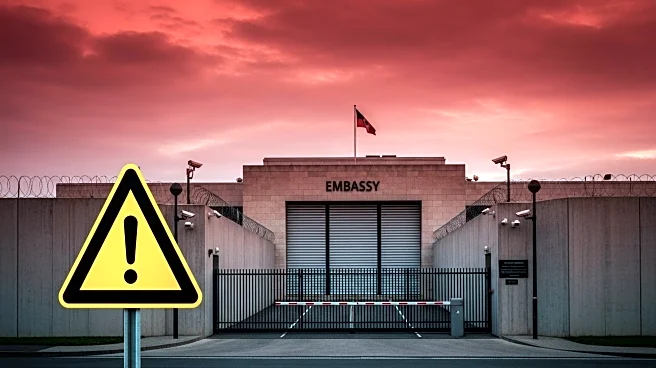What is the story about?
What's Happening?
Venezuela has issued a warning about an alleged extremist plot to attack the closed U.S. Embassy complex in Caracas with explosives. Jorge Rodríguez, head of the National Assembly and a key figure in Venezuela's dialogue with the U.S., stated that the United States was informed of a serious threat from right-wing groups posing as supporters of Venezuelan President Nicolás Maduro. The U.S. State Department has not yet commented on the situation. Despite the embassy's closure following the diplomatic break in 2019, a security and maintenance staff remains on site. Venezuela has reinforced security measures at the embassy, and a European embassy has been informed to act as a liaison. The alert comes amid ongoing tensions, with Venezuela criticizing the U.S. military presence in the Caribbean, which Washington claims is to combat drug cartels.
Why It's Important?
This development underscores the persistent tensions between the U.S. and Venezuela, particularly in the context of U.S. military activities in the Caribbean. The alleged plot highlights the fragile security situation and the potential for escalation in diplomatic conflicts. The U.S. has accused Maduro of drug trafficking, while Venezuela views the U.S. naval presence as a threat to its sovereignty. The situation could impact U.S.-Venezuela relations further, affecting regional stability and international diplomatic efforts. The involvement of a European embassy as a liaison indicates the international dimension of the issue, potentially influencing global diplomatic stances and actions.
What's Next?
The situation may lead to increased diplomatic communications between the U.S., Venezuela, and other international stakeholders. The U.S. may respond with heightened security measures or diplomatic actions, while Venezuela might seek further international support to counter perceived threats. The ongoing military presence in the Caribbean could see adjustments based on developments, and any escalation could prompt reactions from regional allies and international organizations.
Beyond the Headlines
The alleged plot and the broader U.S.-Venezuela tensions reflect deeper geopolitical dynamics, including the influence of external powers in Latin America and the strategic importance of the Caribbean. The situation also raises questions about the role of non-state actors and extremist groups in international conflicts, as well as the effectiveness of diplomatic channels in preventing violence. The narrative of drug trafficking and sovereignty could shape future U.S. foreign policy and regional alliances.















